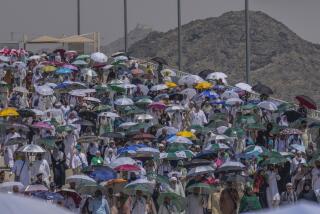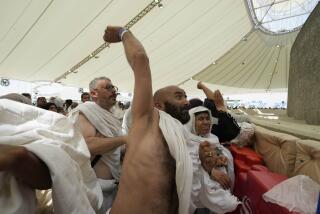WHO raises concern about possible spread of MERS among hajj pilgrims

- Share via
The World Health Organization’s emergency committee on the Middle East Respiratory Syndrome coronavirus, or MERS-CoV, met Wednesday.
After hearing updates on the spread of the virus -- which as of Sept. 20 had killed 58 of the 130 people confirmed to have contracted it, most in Saudi Arabia -- the committee decided against calling the outbreak a “Public Health Emergency of International Concern”: a situation that requires a certain level of immediate, coordinated international action.
At the same time, the group urged countries to strengthen MERS-CoV surveillance and improve their ability to diagnose the illness as pilgrims return to their homes from the hajj pilgrimage later this fall. The hajj typically brings around 3 million travelers each year to Mecca, in Saudi Arabia.
“Levels of surveillance are suboptimal in a number of countries that may be particularly at risk,” said Dr. Keiji Fukuda, WHO assistant director-general for health security and environment, during a call with reporters at the close of the session.
MERS first came to the attention of public health officials in 2012. The virus seems to pose the greatest threat to people with preexisting medical conditions, some of whom have developed severe respiratory and kidney problems after infection. Over the summer months, Fukuda said, the numbers of reported cases of MERS have been elevated but steady. He said it was hard to tell if those increases reflected greater numbers of infections or improvements in countries’ efforts to detect and report illnesses.
Although recent research is improving infectious disease specialists’ knowledge about the virus, public health officials still do not fully understand how people contract the virus, what animals pass it along and whether it propagates differently at different times of the year, Fukuda said.
“We’re still early in our understanding of how to put this together,” he added.
The hajj poses a particular worry for public health workers because Saudi Arabia has had more cases of the disease than any other nation -- 108, including 47 fatalities.
The WHO committee called on countries that will send pilgrims to Saudi Arabia in coming months to step up surveillance efforts as their citizens return home from the Middle East. But for some countries -- particularly those in developing regions such as sub-Saharan Africa -- it won’t be easy, Fukuda said. Tracking cases and patterns of infection takes lab testing facilities and communications systems, basic capacities that are “limited” in the developing world, he said. (The WHO offers this advice for hajj travelers; the U.S. Centers for Disease Control has these recommendations.)
Fukuda did not comment at length on efforts by Saudi Arabian officials to combat the virus, except to note that the kingdom had “made extensive efforts to investigate these cases and get a better handle on things.” Over the last year, Saudi Arabia has come under fire from some for its MERS response.
Fukuda said that the emergency committee would convene again sometime in late November, after the pilgrimage season had concluded.







